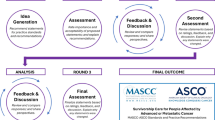Abstract
Improved cancer screening and treatment advances have led to higher cancer survival rates in the United States. However, racial disparities in breast cancer survival persist for African American women who experience lower survival rates than white women. These disparities suggest that unmet needs related to survivorship still exist. This study focuses on the challenges that both African American cancer survivors and caregivers face across the cancer continuum. Five African American focus groups examined cancer survivor and caregiver support needs. Focus groups were recorded, transcribed, and uploaded into Atlas.ti. Thematic content analysis was applied to the text during the coding process. Themes were identified and emphasized based on the research team’s integrated and unified final codes. Forty-one African Americans participated in five focus groups: 22 cancer survivors and 19 caregivers. Participants discussed five themes: (1) a culture that discourages the discussion of cancer; (2) lack of support services for African American cancer survivors; (3) lack of support services for cancer caregivers; (4) need for culturally appropriate cancer resources, including resources targeted at African American women; and (5) aspects that were helpful to cancer survivors and caregivers, including connecting with other survivors and caregivers, and having strong social support networks. We gained new insight into the unmet support needs for survivors and caregivers, especially when coping with the cancer experience continuum. While some cancer and caregiver support services exist, our study reveals a great need for services that incorporate the cultural differences that exist across races.
Similar content being viewed by others
References
National Cancer Institute (2013) SEER cancer statistics review, 1975–2010. Bethesda, MD. http://seer.cancer.gov/csr/1975_2010/sections.html. Accessed 23 Aug 2013
National Cancer Institute (2009) SEER cancer statistics review 1975–2007 Bethesda, MD: http://seer.cancer.gov/csr/1975_2007/. Accessed 25 Aug 2013
Davis C, Darby K, Likes W, Bell J (2009) Social workers as patient navigators for breast cancer survivors: what do African-American medically underserved women think of this idea? Soc Work Health Care 48(6):561–578
Haynes-Maslow L, Godley P, Dimartino L, White B, Odom J, Richmond A, Carpenter W (2014) African American women’s perceptions of cancer clinical trials. Cancer Medicine 3(5):1430–1439
Yoo GJ, Ellen L, Pasick R (2014) Breast cancer and coping among women of color: a systematic review of the literature. Support Care Cancer 22(3):811–824
Hamilton JB, Moore Charles E, Powe Barbara D, Agarwala M, Maratin P (2010) Perceptions of support among older African American cancer survivors. Oncol Nurs Forum 37(4):484–493
Byers TE, Wolf JJ, Bauer KR, Bolick-Aldrich S, Chen VW, Finch JL et al (2008) Patterns of Care Study Group. The impact of socioeconomic status on survival after cancer in the United States: findings from the National Program of Cancer Registries Patterns of Care Study. Cancer 113(3):582–591
Albano JD, Ward E, Jemal A, Anderson R, Cokkinides VE, Murray T et al (2007) Cancer mortality in the United States by education level and race. J Natl Cancer Inst 99(18):1384–1394
Ghods B, Roter DL, Ford DE, Larson S, Arbelaez JJ, Cooper LA (2008) Patient-physician communication in the primary care visits of African Americans and whites with depression. J Gen Intern Med 23(5):600–606
Eggly S, Barton E, Winckles A, Penner LA, Albrecht TL (2013) A disparity of words: racial differences in oncologist-patient communication about clinical trials. Health Expect. doi:10.111/hex.12108
Sheppard VB, Llaanos AA, Hurtado-de-Mendoza A, Taylor TR (2013) Correlates of depressive symptomatology in African-American breast cancer patients. J Cancer Surviv 7(3):292–299
Francis LE, Karen F, Bowman GK, Rose JH (2011) Relationships and emotional well-being among African American and white advanced cancer caregivers. Patient Educ Couns 85(3):446–453
Bowman KF, Rose JH, Radziewicz RM, O’Toole EE, Ann BR (2009) Family caregiver engagement in a coping and communication support intervention tailored to advanced cancer patients and families. Cancer Nurs 32(1):73–81
Guest G, MacQueen KM, Namey EE (2012) Applied thematic analysis. Sage Publications, Los Angeles
Wells AA, Gulbas L, Sanders-Thompson V, Shon E-J, Kreuter MW (2014) African-American breast cancer survivors participating in a breast cancer support group: translating research into practice. J Cancer Educ 29:619–625
Campbell M, Hudson MA, Resnicow K, Blakeney N, Paxton A, Baskin M (2007) Church-based health promotion interventions: evidence and lessons learned. Annu Rev Public Health 28:213–234
Ashing-Giwa KT (2000) Quality of life and psychosocial outcomes in long-term survivors of breast cancer. J Psychosoc Oncol 17:47–62
Acknowledgments
The authors would like to thank the focus group participants for their time and William Carpenter, Ph.D, for his gracious editorial assistance. Marlyn Allicock, Ph.D. and La-Shell Johnson’s time was supported by the National Cancer Institute Center to Reduce Cancer Health Disparities, Community Network Program Centers (CNPC), and the Carolina Community Network (Grant No. 3U54153602-04S1).
Author information
Authors and Affiliations
Corresponding author
Rights and permissions
About this article
Cite this article
Haynes-Maslow, L., Allicock, M. & Johnson, LS. Cancer Support Needs for African American Breast Cancer Survivors and Caregivers. J Canc Educ 31, 166–171 (2016). https://doi.org/10.1007/s13187-015-0832-1
Published:
Issue Date:
DOI: https://doi.org/10.1007/s13187-015-0832-1




